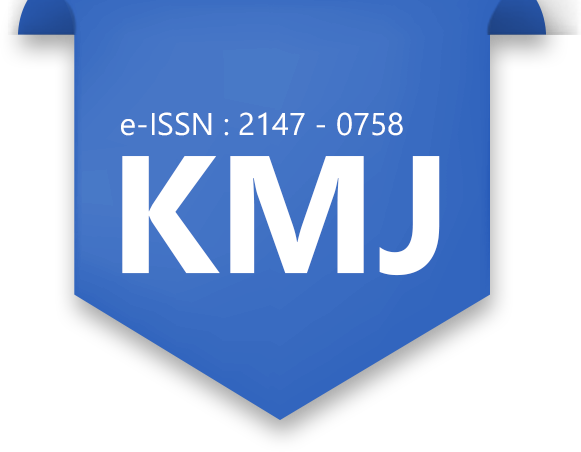
An Important Clinical Marker Concerning COVID-19 Infection: Olfactory and Taste Dysfunction
Metin Yüksel Akyıldız, Gürcan SünnetciDepartment of Otolaryngology Head and Neck Surgery, Darıca Farabi Teaching and Research Hospital, Kocaeli, TurkeyINTRODUCTION: The presence of a minor and nonspecific symptoms, such as loss of smell and/or taste in patients, may be a stand-alone symptom for the diagnosis of COVID-19 infection. Therefore, it is critical to know the relationship between COVID-19 and loss of smell and/or taste. Especially in patients without major symptoms, acute loss of smell and/or taste will be beneficial not only for early diagnosis and isolation but also for preventing viral spread.
METHODS: In our research, a cohort study was conducted based on the olfactory loss measurement tool developed and validated for clinicians by the American Academy of OtolaryngologyHead and Neck Surgery.
RESULTS: In 40.4% of cases, the complaint of loss of smell and/or taste was determined to present itself before the diagnosis of COVID-19. It was found that the prevalence of loss of smell and/or taste did not differ significantly depending on gender and age groups.
DISCUSSION AND CONCLUSION: In this study, symptoms of loss of smell and taste in COVID-19 positive patients were observed at a significantly higher rate in line with the literature. Additionally, in terms of Otorhinolaryngology clinic, it can be expected that potential cases of loss of smell and/or taste due to COVID-19 will continue to be seen in the future. For this reason, it is particularly important to question the loss of smell and/or taste in all patients who apply to the outpatient clinic, and to pay attention during endoscopic examination and other procedures that carry a high risk in possible cases.
COVID-19 Enfeksiyonu İle İlişkili Önemli Bir Klinik Belirteç: Koku ve Tat Bozukluğu
Metin Yüksel Akyıldız, Gürcan SünnetciKocaeli Darıca Farabi Eğitim ve Araştırma Hastanesi, Kulak Burun Boğaz Kliniği, Kocaeli, TürkiyeGİRİŞ ve AMAÇ: COVID-19 vakalarında koku ve/veya tat kaybı gibi minör ve nonspesifik bir semptomun olması, tanı için tek başına bir bulgu olabilir. Bu nedenle COVID-19 ile koku ve/veya tat kaybı arasındaki ilişkinin bilinmesi kritik bir öneme sahiptir. Özellikle major semptomları olmayan hastalarda akut koku ve/veya tat kaybının görülmesi, erken tanı ve izolasyonla birlikte viral yayılımın önlenmesi açısından yararlı olacaktır.
YÖNTEM ve GEREÇLER: Çalışmamızda Amerikan Otolaringoloji-Baş Boyun Cerrahisi Akademisi tarafından klinisyenler için geliştirilmiş ve validasyonu sağlanmış olan koku kaybı ölçümleme aracı esas alınarak kohort bir araştırma yapıldı.
BULGULAR: Bu çalışmada COVID-19 pozitif olan ve tat ve/veya koku kaybı görülen hastaların %40,4ünde koku ve/veya tat kaybı şikayeti tanı konulmadan önce başladığı görüldü. Koku ve/veya tat kaybı prevalansının, cinsiyet ve yaş gruplarına göre anlamlı farklılık göstermediği saptandı.
TARTIŞMA ve SONUÇ: Bu çalışmada COVID-19 pozitif hastalarda koku ve tat kaybı semptomları literatürle uyumlu olarak anlamlı derecede yüksek oranda görülmüştür. Ayrıca Kulak Burun Boğaz kliniği açısından önümüzdeki dönemde de potansiyel COVID-19 a bağlı koku ve/veya tat kaybı vakaları görülmeye devam edecektir. Bu nedenle polikliniğe başvuran tüm hastalarda mutlaka koku ve/veya tat kaybının sorgulanması, yüksek risk taşıyan endoskopik muayene ve diğer işlemlerde dikkat edilmesi açısından çok önemlidir.
Manuscript Language: English












